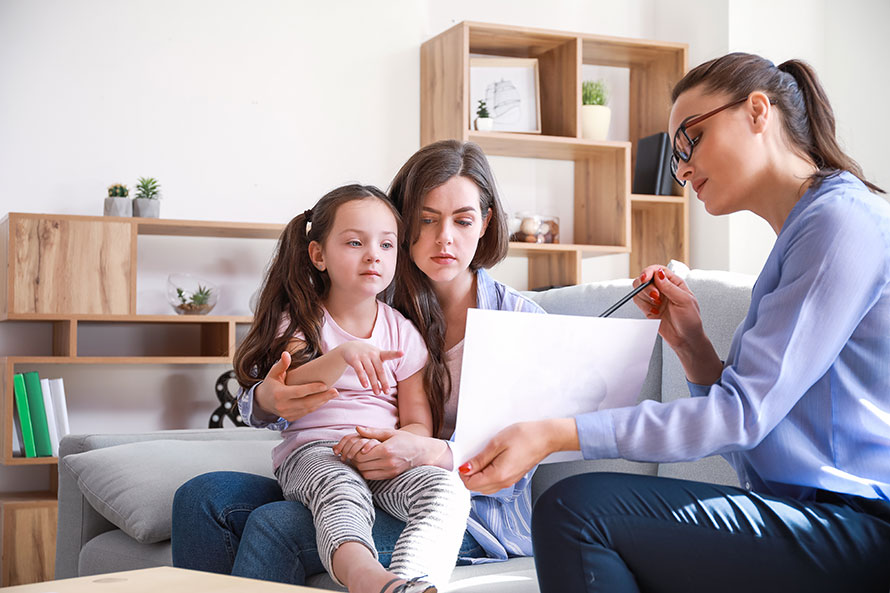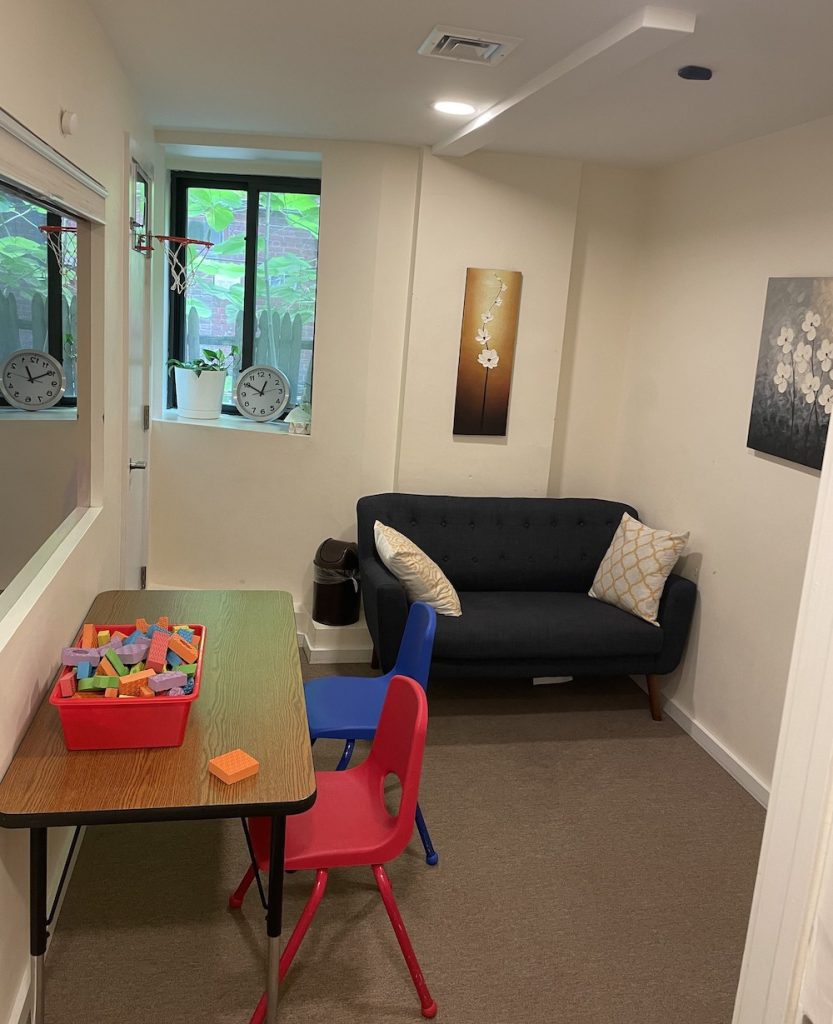What is Parent-Child Interaction Therapy?

For PCIT for Toddler 12-25 Months, click here.
For PCIT for Older Children Ages 7-10, click here.
PCIT is a way to help children aged 2-7 years old and their parents or caregivers. It's about improving how children interact, boosting their social skills, teamwork, and the connection between parent and child. It also helps parents feel more confident and decreases child behavior problems, like being defiant or aggressive.
How PCIT Works
In PCIT, parents and kids meet with a psychologist. This special therapy has been proven through over 150 studies to help kids with various problems, like being aggressive, not listening, disruptive, or being challenging.
Parents learn in a playroom while a therapist guides them behind a one-way mirror using an earpiece. This gives parents instant feedback on their parenting skills. It's a fast way to learn and helps kids focus on playing rather than being aware of the therapist.
PCIT has helped lots of families improve their relationships and handle tough behaviors in kids.
What Parents and Children Gain from PCIT

In PCIT, parents and kids learn important skills together. PCIT teaches techniques from play therapy that make good child behavior stronger and shows ways to manage behavior to make negative behavior less common.
PCIT has two parts: child-directed interaction (CDI) and parent-directed interaction (PDI).
In CDI, parents pick up play skills similar to those used in play therapy. These skills help them involve their child in play situations, making the parent-child bond stronger.
During PDI, parents learn to guide their child’s actions using clear, age-appropriate instructions. They also set consistent results to get better cooperation from their child.
How Long Does PCIT Therapy Take?
The duration of PCIT treatment is different for each family, but families stay in treatment until parents show they have mastered the skills and see their child’s behavior improving.
On average, treatment takes about 16 weeks with one-hour sessions every week.
Our PCIT Therapy Staff & Locations
We are one of only a few official PCIT centers in Manhattan.
We have 7 trained PCIT clinicians, 3 of whom are Within Agency PCIT Trainers.
We can provide PCIT either in person or remotely through Telehealth.
We have 2 formal PCIT rooms with 1-way mirrors, and offer PCIT at New York Location:
Upper West Side
107 W 82nd Street (corner of Columbus Ave.)
Suite 101
New York, NY 10024
Please download a PCIT Brochure here: PCIT Brochure_MPG
How PCIT Therapy Helped Johnny
When considering the benefits of Parent-Child Interaction Therapy (PCIT), the focus often falls on its effectiveness in managing disruptive behavior in children. However, What might be easily overlooked is its remarkable ability to mend and strengthen parent-child attachments that might have been strained due to various life circumstances. (e.g., divorce, long work hours, or parental mental health challenges).
Such was the case in the following example, showcasing the positive results of this highly researched treatment method.
“Johnny, a 6-year-old boy, and his mother, who sought PCIT treatment following her decision to leave her job and resume her role as Johnny's primary caregiver. Moreover, Johnny had grown accustomed to his aunt’s care and struggled to adapt to this change. As a result, he began displaying challenging behaviors and lay a deeper issue - a lack of a secure attachment between Johnny and his mother. This was further complicated by his mother’s history of depression, which hindered her ability to actively engage with Johnny and build a nurturing connection.
Over the course of their PCIT journey, significant changes emerged in the interaction between Johnny and his mother. The following examples highlight the positive shifts that occurred as a result of their active participation in PCIT:
| Before Treatment | After Treatment |
| During playtime, Johnny's mother would be by his side, yet her involvement lacked enthusiasm. | Post-therapy, Johnny's mother acquired specific play skills that breathed warmth, affection, and positive energy into their playtime. |
| Johnny's mother often appeared weighed down by feelings of depression and lacked the energy to engage fully. | A noticeable transformation emerged as Johnny's mother radiated happiness and renewed energy. |
| Johnny's mother lacked the confidence to effectively interact with him and manage his challenging behavior. | Empowered by newfound skills, Johnny's mother displayed confidence in employing play and parenting techniques. |
| Johnny's home environment was marked by his oppositional behavior and displays of aggression. | Remarkably, Johnny's oppositional behavior and aggression at home saw a significant reduction. |
| In public settings, Johnny's mother felt overwhelmed and anxious when dealing with him and his brother. | Furthermore, Johnny's mother felt secure in communicating her expectations to both children in public, ready to enforce consequences if needed. |
The case study showcased above vividly demonstrates the favorable effects of PCIT. This therapeutic approach excels not only in reducing disruptive behaviors in children but also in fostering a vibrant and positive parent-child relationship. This connection radiates warmth, enthusiasm, security, and newfound confidence.
In addition to personalized PCIT, we provide a variety of other parent training choices:
- PCIT-Toddlers - Designed for children aged 12-24 months dealing with challenges in managing emotions.
- Parent Management Training - Tailored for older kids who may not be suitable for traditional therapy or are resistant to it.
- SPACE Training - Geared towards parents of anxious children who may be unable or unwilling to participate in therapy sessions.
- 3-Part Educational Webinar Series: Ideal for parents of children with Anxiety, ADHD, and ODD, offering insightful guidance.
- 6-8 Week, Clinical PMT Groups - Specifically designed for parents of children with Anxiety, ADHD, and ODD, creating a supportive learning environment.
Frequently Asked Questions (FAQ)
What is Parent-Child Interaction Therapy (PCIT)?
Parent-Child Interaction Therapy (PCIT) is a method designed to assist children aged 2-7 and their parents or caregivers. It focuses on improving how children interact, enhancing their social skills, strengthening the parent-child connection, boosting parental confidence, and reducing problematic child behaviors like defiance or aggression.
How does PCIT work?
In PCIT, parents and children engage in therapy sessions with a psychologist. This therapy has been backed by over 150 studies and is effective in addressing various issues in children, including aggression, non-compliance, disruptiveness, and challenging behavior. Parents learn essential skills in a playroom, guided by a therapist who provides real-time feedback through an earpiece. This approach accelerates the learning process while allowing children to focus on play rather than the therapist's presence.
What are the benefits of PCIT for parents and children?
PCIT equips parents and children with important skills. It incorporates techniques from play therapy to reinforce positive child behavior and provides strategies to manage negative behavior effectively. PCIT comprises two main components: Child-Directed Interaction (CDI), where parents enhance their play skills to strengthen the parent-child bond, and Parent-Directed Interaction (PDI), where parents learn to guide their child's actions with clear instructions and establish consistent consequences for better cooperation.
How long does PCIT therapy typically take?
The duration of PCIT treatment varies for each family. Families continue with treatment until parents demonstrate mastery of the skills and witness improvements in their child's behavior. On average, PCIT lasts for approximately 16 weeks, involving one-hour sessions held weekly.
Where can I access PCIT therapy, and is it available online?
We are among the few official PCIT centers located in Manhattan. Our team comprises seven trained PCIT clinicians, including three within agency PCIT Trainers. We offer PCIT services both in person at our center on the Upper West Side and remotely through Telehealth.
How can I learn more about PCIT or schedule a consultation?
If you'd like to gather more information about PCIT or discuss how it might benefit your child, please don't hesitate to contact us. We are here to provide you with additional details and assist you in scheduling a consultation.
Can PCIT therapy help improve parent-child relationships?
Absolutely, PCIT is effective not only in addressing disruptive behaviors in children but also in nurturing and strengthening the parent-child relationship. It promotes warmth, enthusiasm, security, and newfound parental confidence. The case study provided illustrates the positive transformation that can occur through PCIT therapy.
We serve patients from Long Island City, NY, and New York, NY




